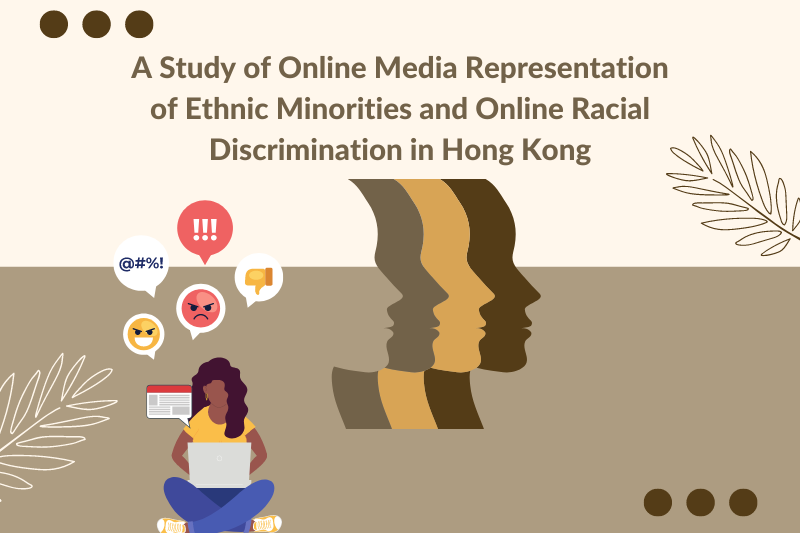
Quality Trilingual Caretaker Input Facilitates Early Trilingual Development
31 August 2022
Ghost Marriage and Corpse Trading Crime in Rural China
31 August 2022First Ever Online Racial Discrimination Study in Hong Kong
Principal investigator: Dr WANG Yuan (Department of Media and Communication)

Hong Kong is a culturally diversified society where Chinese and foreigners living together in harmony. According to the 2016 Population By-census, there were about 584,383 non-Chinese people in Hong Kong, or about 8% of the population. Among them, more than half are foreign domestic helpers from the Philippines and Indonesia, and about 30% of the population of ethnic minorities are South Asians including Indians, Pakistanis, and Nepalese. The ethnic minorities in Hong Kong are often associated with poverty, crime, and hygiene issues and suffer from racial discrimination. Thus, it is important to avoid racial bias, stereotypes, and discrimination against those people.
Funded by the Equal Opportunities Commission (EOC), Dr WANG Yuan, Assistant Professor of CityU’s Department of Media and Communication, led a research project titled “A Study of Online Media Representation of Ethnic Minorities and Online Racial Discrimination in Hong Kong.” This project analysed how online news articles and their reader comments portray ethnic minority groups in Hong Kong during the COVID-19 pandemic and whether this portrayal involves racial bias, stereotypes, or discrimination. It analysed 341 news articles related to ethnic minority groups and racial issues published on online media platforms in Hong Kong during the pandemic and the 7,381 comments left by their readers. The research team also conducted a survey of 250 Hong Kong residents belonging to ethnic minority groups to examine whether and how people from ethnic minority groups in Hong Kong experience online racial discrimination and to explore the antecedents, moderators, and outcomes of this discrimination. The preliminary findings of this project were presented at the annual conference of the International Communication Association in Paris, France in 2022.
The findings of the content analysis study show that only 0.3% of the sampled articles contained racial bias, stereotypes, or discrimination in their reporting of race-related issues, and 0.9% of those articles used pejorative or stereotypical terms. By comparison, 4.7% of the reader comments contained racial bias, stereotypes, or discrimination, whereas 4.3% adopted pejorative or stereotypical terms when describing ethnic minorities groups. With regard to the tone of news articles and their reader comments, over 90% of them adopted a neutral tone. While only 1.2% of race-related news articles were found to utilise a negative tone, 4.9% of reader comments adopted a negative tone. Among the ethnic minority groups, Filipinos and Indonesians were most frequently referred in reader comments. Nepalese were most frequently mentioned in negative reader comments. Nearly half of the race-related news articles discussed health and crime issues. In particular, more reader comments of non-COVID-19-related news articles used pejorative or stereotypical terms and the negative tone compared with their COVID-19 counterparts.
Although the online racial discrimination observed in the survey was not very serious, some ethnic minorities in Hong Kong felt that they experienced online racial discrimination at times. People from ethnic minority groups using social media for race-related purposes (e.g. commenting about high-profile incidents related to race) were more likely to experience more online racial discrimination. Ethnic minorities’ experience of online racial discrimination can significantly induce their depressive symptoms and aggressive behaviour (e.g., verbal or physical fights with other people). Moreover, the effect of online racial discrimination on depressive symptoms was found to be weaker among ethnic minorities with higher self-esteem. For ethnic minorities who spent more time online, the relationship between online racial discrimination and aggressive behaviour was also weaker.
This study was one of the first to examine online racial discrimination in Hong Kong. It provided practical recommendations to local online media companies, ethnic minority groups in Hong Kong, the Hong Kong Government, and the EOC for addressing online racial discrimination. A summary of these recommendations is provided as follows:
Recommendations for Online Media Companies in Hong Kong
1. Reporters and editors should be provided with training on how to avoid racist terminologies in reports and how to deal with reader comments that involve racism.
2. Online media platforms can adopt anti-discrimination and anti-harassment policies and ask their members and readers to agree with those terms and conditions.
Recommendations for Ethnic Minorities in Hong Kong
3. People from ethnic minority groups are suggested to report to the online media companies if they come across any abusive contents, discriminatory comments, and misinformation in news articles and reader comments.
4. They may consider filing complaints in writing to the EOC when they identify news articles and reader comments posted on online media platforms that may amount to racial vilification under the Race Discrimination Ordinance.
Recommendations for the Hong Kong Government
5. More resources can be given to Support Service Centres for Ethnic Minorities to provide courses or activities for enhancing the self-esteem of ethnic minorities, with a view to protecting them from negative outcomes of online racism, such as depressive symptoms.
Recommendations for the EOC
6. As a statutory body tasked to enforce the Race Discrimination Ordinance (Cap. 602), the EOC may consider taking actions against online racial discrimination in Hong Kong.
7. The EOC should plan and implement public relations campaigns against online racial bias, stereotyping, and discrimination and promote equal opportunity.
Achievements
Wang, Y., Meng, X., & Chui, W. H. (2022, November 17–20). Exploring the effect of social media use on online racial discrimination: An investigation of ethnic minorities in Hong Kong [Paper presentation]. 108th annual convention of the National Communication Association, New Orleans, LA, United States.
Wang, Y., Meng, X., & Chui, W. H. (2022, May 26–30). Racial discrimination in online media: How online news and reader comments portray ethnic minorities in Hong Kong [Paper presentation]. 72nd annual conference of the International Communication Association, Paris, France.
